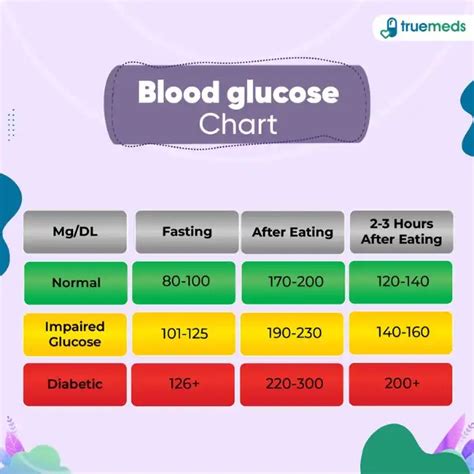Intro
Discover the ideal normal blood glucose level range, understanding fasting and post-meal targets, and learn how to maintain healthy blood sugar levels, managing diabetes and prediabetes through lifestyle and diet changes.
Maintaining normal blood glucose levels is crucial for overall health and well-being. Blood glucose, also known as blood sugar, is the primary source of energy for the body's cells. When blood glucose levels are within a normal range, the body functions properly, and the risk of developing chronic diseases such as diabetes, heart disease, and stroke is reduced. In this article, we will delve into the importance of normal blood glucose levels, the factors that influence them, and the steps that can be taken to maintain a healthy blood glucose level.
The importance of normal blood glucose levels cannot be overstated. When blood glucose levels are elevated, the body's cells become less responsive to insulin, a hormone produced by the pancreas that regulates blood sugar levels. This can lead to a range of health problems, including weight gain, fatigue, and increased risk of infection. On the other hand, when blood glucose levels are too low, the body's cells may not receive enough energy, leading to symptoms such as dizziness, shaking, and confusion. Therefore, it is essential to maintain normal blood glucose levels to ensure proper bodily functions and prevent chronic diseases.
Normal blood glucose levels are typically defined as a fasting blood glucose level of less than 100 mg/dL and a postprandial (after meal) blood glucose level of less than 140 mg/dL. However, these values can vary slightly depending on the individual, their age, and their overall health. For example, people with diabetes may have different target blood glucose levels than those without the condition. Additionally, factors such as physical activity, diet, and stress levels can influence blood glucose levels, making it essential to monitor and manage them regularly.
Understanding Blood Glucose Levels

Understanding blood glucose levels is crucial for maintaining normal levels. Blood glucose levels are influenced by a range of factors, including diet, physical activity, and stress levels. When we eat, our body breaks down carbohydrates into glucose, which is then absorbed into the bloodstream. The pancreas responds by producing insulin, which helps to regulate blood glucose levels by facilitating the uptake of glucose by cells. However, when we consume high amounts of sugar or refined carbohydrates, our body may produce too much insulin, leading to a rapid spike in blood glucose levels. This can lead to a range of health problems, including insulin resistance and type 2 diabetes.
Factors That Influence Blood Glucose Levels
There are several factors that can influence blood glucose levels, including: * Diet: Consuming high amounts of sugar, refined carbohydrates, and saturated fats can lead to elevated blood glucose levels. * Physical activity: Regular physical activity can help to lower blood glucose levels by increasing insulin sensitivity. * Stress levels: High stress levels can lead to increased blood glucose levels by stimulating the production of stress hormones such as cortisol. * Sleep: Poor sleep quality and duration can lead to elevated blood glucose levels by disrupting the body's natural hormonal balance. * Medications: Certain medications, such as steroids and certain psychiatric medications, can increase blood glucose levels.Maintaining Normal Blood Glucose Levels

Maintaining normal blood glucose levels requires a combination of healthy lifestyle habits and regular monitoring. Here are some tips to help maintain normal blood glucose levels:
- Eat a balanced diet: Focus on whole, unprocessed foods such as fruits, vegetables, whole grains, lean proteins, and healthy fats.
- Stay hydrated: Drink plenty of water throughout the day to help regulate blood glucose levels.
- Exercise regularly: Aim for at least 150 minutes of moderate-intensity exercise per week.
- Manage stress: Engage in stress-reducing activities such as meditation, yoga, or deep breathing exercises.
- Get enough sleep: Aim for 7-9 hours of sleep per night to help regulate blood glucose levels.
Monitoring Blood Glucose Levels
Monitoring blood glucose levels is essential for maintaining normal levels. There are several ways to monitor blood glucose levels, including: * Fasting blood glucose test: This test measures blood glucose levels after an overnight fast. * Postprandial blood glucose test: This test measures blood glucose levels after a meal. * Continuous glucose monitoring: This involves wearing a small device that tracks blood glucose levels throughout the day. * Self-monitoring of blood glucose: This involves using a glucometer to track blood glucose levels at home.The Benefits of Normal Blood Glucose Levels

Maintaining normal blood glucose levels has numerous benefits, including:
- Reduced risk of chronic diseases: Normal blood glucose levels can help reduce the risk of developing chronic diseases such as diabetes, heart disease, and stroke.
- Improved energy levels: Normal blood glucose levels can help improve energy levels and reduce fatigue.
- Weight management: Normal blood glucose levels can help with weight management by reducing cravings for sugary and high-carbohydrate foods.
- Improved mental health: Normal blood glucose levels can help improve mental health by reducing symptoms of anxiety and depression.
Statistical Data
According to the Centers for Disease Control and Prevention (CDC), more than 30 million people in the United States have diabetes, and an additional 84 million people have prediabetes. Maintaining normal blood glucose levels can help reduce the risk of developing these conditions. Additionally, a study published in the Journal of Clinical Endocrinology and Metabolism found that maintaining normal blood glucose levels can reduce the risk of cardiovascular disease by up to 50%.Common Mistakes That Can Affect Blood Glucose Levels

There are several common mistakes that can affect blood glucose levels, including:
- Consuming high amounts of sugar and refined carbohydrates
- Not getting enough physical activity
- Not managing stress levels
- Not getting enough sleep
- Not monitoring blood glucose levels regularly
Tips for Avoiding These Mistakes
Here are some tips for avoiding these mistakes: * Read food labels carefully to avoid consuming high amounts of sugar and refined carbohydrates. * Aim for at least 150 minutes of moderate-intensity exercise per week. * Engage in stress-reducing activities such as meditation or deep breathing exercises. * Aim for 7-9 hours of sleep per night. * Monitor blood glucose levels regularly to catch any potential problems early.Conclusion and Next Steps

In conclusion, maintaining normal blood glucose levels is essential for overall health and well-being. By understanding the factors that influence blood glucose levels, maintaining a healthy lifestyle, and monitoring blood glucose levels regularly, individuals can reduce their risk of developing chronic diseases and improve their overall quality of life. We encourage readers to take the next step by implementing these tips into their daily routine and sharing this article with others who may benefit from this information.
What is a normal blood glucose level?
+A normal blood glucose level is typically defined as a fasting blood glucose level of less than 100 mg/dL and a postprandial (after meal) blood glucose level of less than 140 mg/dL.
What factors can influence blood glucose levels?
+Factors that can influence blood glucose levels include diet, physical activity, stress levels, sleep, and certain medications.
How can I maintain normal blood glucose levels?
+Maintaining normal blood glucose levels requires a combination of healthy lifestyle habits, including eating a balanced diet, staying hydrated, exercising regularly, managing stress, and getting enough sleep.
We invite readers to comment below with any questions or concerns they may have about maintaining normal blood glucose levels. Additionally, we encourage readers to share this article with others who may benefit from this information. By working together, we can promote healthy lifestyles and reduce the risk of chronic diseases.
